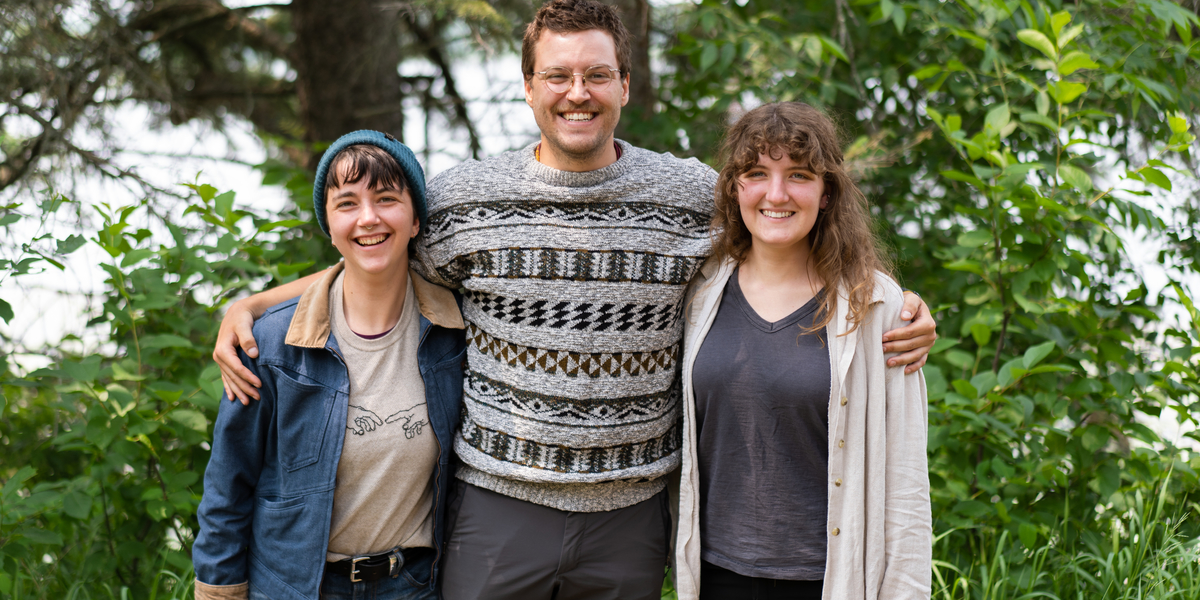
Itasca Biological Research Station is beloved by all for its exceptional educational programs, thriving research opportunities and access to diverse outdoor locations. Many CBS faculty and students get to experience the beauty of the station periodically throughout the summer, but few get to experience the behind-the-scenes at the station all season long. We asked Itasca student interns Madie Cloutier (Ecology, Evolution, and Behavior), Lou Hoff (Plant and Microbial Biology), and Alex Doebler (Ecology, Evolution, and Behavior) to share what they love about the station.
What interested you in joining the team?
Madie: I took some field biology classes in the summer of 2021 and it was one of the best undergraduate experiences I had. I was determined to find a way to spend more time at the station! Last year I became the station assistant and fell even more in love with Itasca and the programs that happen there. Now I feel very lucky to be an intern at the station for the second year in a row.
Lou: I was originally interested in joining the team because I really like being at Itasca. The vibes are just really good. Originally I was vying for the Station Intern position (Sorry Alex) but then Jonathan reached out to me to talk about doing some history research this summer. I'm a history minor and I never thought anything would come of it so when I was presented with the opportunity to explore some of my other interests at one of my favorite places, I jumped on it.
Alex: I fell in love with the station when I took field bio classes in the Summer of 2022!
What’s your favorite part of being an intern?
Madie: How do I choose?! The sunsets, meals at the dining hall, great fishing, living inside a state park, always being amongst friends, helping support a mission of research and hands-on learning… I love it all!
Lou: I think my favorite part of being an intern is the access to nature. Who else can say they lived inside a state park? I also love being around all the other people that are into the outdoors. A very common occurrence is someone getting distracted in the middle of a conversation to figure out what a bird is or wandering off to go look at a plant.
Alex: My favorite part of being an intern is enjoying everything the station and the park has to offer during my down time, whether that’s canoeing, hiking, fishing, or just exploring the forests.
The research station has access to a lot of incredible natural spaces around the park. Any favorite locations?
Madie: Iron Springs Bog is definitely my favorite place. It's such a fascinating and beautiful ecosystem. I really like to walk around Iron Springs and look at all the sundews, mosses, orchids, and pitcher plants, and see how many different species of frog I can find!
Lou: My favorite place I've been in the park is Iron Corner lake. It's a more remote lake by the section of the North Country trail that goes through the park. One of my favorite activities is hiking by myself and I found that lake completely on accident one day. It was so peaceful and it was there I realized why people love the North Woods so much.
Alex: The fire tower has an incredible view for miles and miles, and is relatively close to the station, but my favorite location in the park is the absolute anomaly of a lake that is Hernando Desoto Lake in the southern edge of the park. The lake is only accessible by hike or by portaging a canoe, but fishing it is like a dream come true.
What research topics at Itasca do you find most interesting?
Madie: All of the research is super interesting and important, but if I did have to choose one area of research, I think it would have to be dragonflies. Itasca has an abundant and diverse dragonfly population which attracts many different kinds of dragonfly researchers looking at everything from predatory adaptations to migration patterns. The implications of the research are really important, encompassing things like understanding how to design better aircraft and helping us understand how climate change may be affecting different ecosystems. Plus, we should all care about dragonflies anyways because they keep our mosquito population in check!
Lou: My heart is with the fungi. I just think they are such interesting organisms that break all of the rules that we know about biology and they are pretty tasty too. So, the Schilling's Lab research on wood decomposition is pretty neat to me. But, slowly, my interests are diverging, due to the research I've helped out with–namely the lake monitoring research. Watching lakes change throughout the summer has helped to encourage my interest in water. So, I guess now it is the age old debate of am I an aquatic or a terrestrial person?
Alex: I find the research that centers around ecological interactions the most interesting. Whether that’s direct competition between flying squirrel species or chemical signaling in fish, etc.